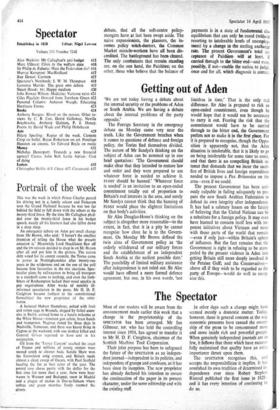Getting out of Aden
'We are not today having a debate about the internal security or the problems of Aden or South Arabia. We are having a debate about the internal problems of the party opposite.'
The Foreign Secretary in the emergency debate on Monday came very near the truth. Like the Government benches when it comes to questions of defence and foreign policy, the Tories find themselves divided. The nature of Mr Sandys's thinking on the subject of Aden can be summed up in one brief quotation: 'The Government should make clear that they intended to restore law and order and they were prepared to use whatever force is needed to achieve it. FLOSY should be banned.' Whatever force is needed' is an invitation to an open-ended commitment totally out of proportion to Britain's real interests in the area, and surely Mr Sandys cannot think that the banning of nosy would place the slightest limitations on that body's activities.
Sir Alec Douglas-Home's thinking on the subject is altogether more reasonable—to the extent, in fact, that it is a pity he cannot recognise how close he is to the Govern- ment. On Monday Mr Brown defined the twin aims of Government policy as 'the orderly withdrawal of our military forces and the establishment of an independent South Arabia at the earliest possible date.' The possibility of limited military assistance after independence is not ruled out. Sir Alec would have offered a more formal defence agreement, but one, in his own words, 'not limitless in time.' That is the only real difference. Sir Alec is prepared to risk an open-ended commitment, even though he would hope that it would not be necessary to carry it out. Fearing the risk that the commitment would have to be carried through to the bitter end, the Government prefers not to make it in the first pbce. For it is prepared to recognise, though the Oppo- sition is apparently not, that the Aden situation is intolerable, that it is likely to go on being intolerable for some time to come, and that there is no compelling British in- terest that demands that we incur the sacri- fice of British lives and foreign expenditure needed to impose a Pax Britannica on the area—even if we could.
The present Government has been seri- ously culpable in failing adequately to pre- pare the new South Arabian Federation to defend its own integrity after independence. It has had a salutary lesson on the fatuity of believing that the United Nations can be a substitute for a foreign policy. It may even have learned to concern itself less with im- potent initiatives about Vietnam and more with those parts of the world that remain —even if only just—within Britain's sphere of influence. But the fact remains that the Government is right in refusing to be stam- peded by the present violence in Aden into getting Britain still more deeply involved in the Persian Gulf; and the ConServatives- above all if they wish to be regarded as the party of Europe—would do well to recog- nise this.






























 Previous page
Previous page